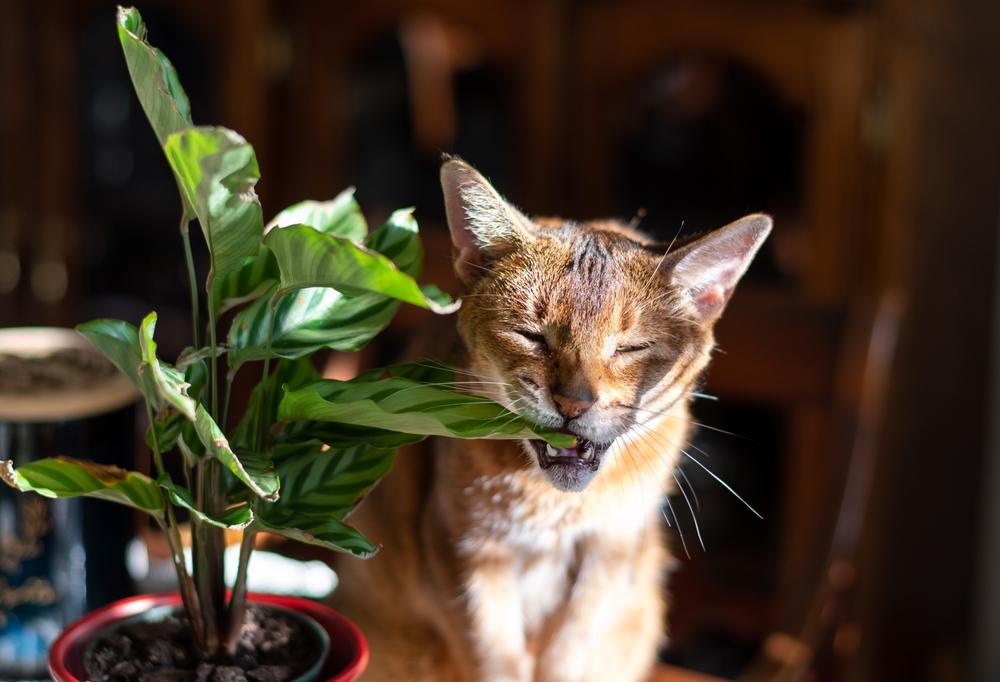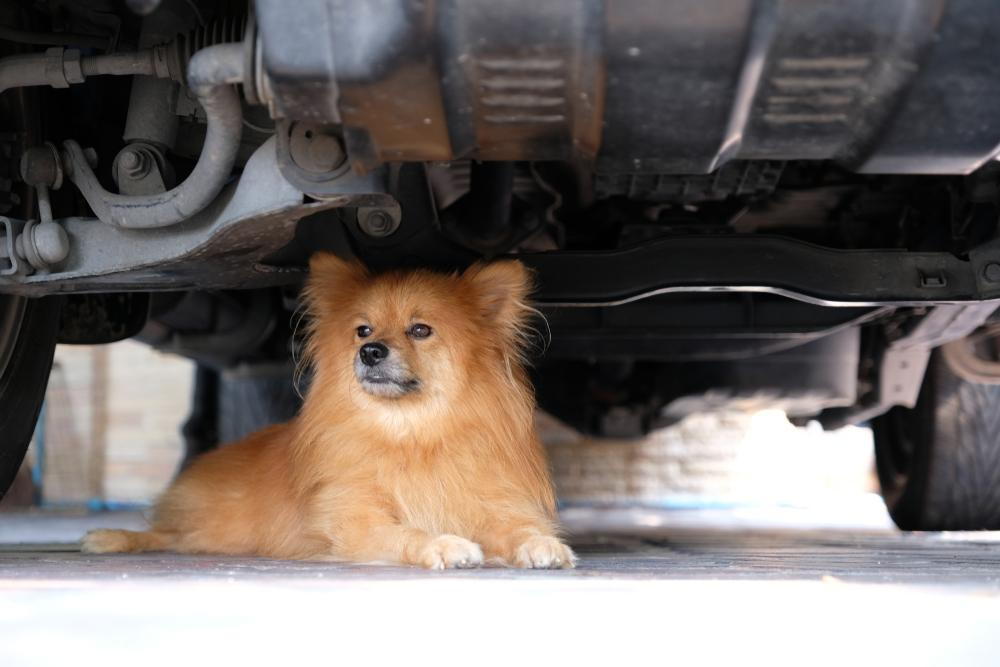Now serving Urgent Care needs Mon – Fri during business hours.
Nuestro staff habla Español!
Talk About Toxic: Common Household Pet Toxins

Talk About Toxic: Common Household Pet Toxins
- posted: Apr. 18, 2024
Pets have a nose for trouble and may discover a household toxin as they sniff around for adventure—or something to eat. As your curious pet noses or paws at an intriguing item—or worse, tries a taste—they can be poisoned.
Knowing the potential dangers that lurk in your home, yard, and garage can keep your pet safe. By learning these home hazards, you can take precautionary measures to prevent accidental exposure.
Household toxins for pets
You consider your home a sanctuary where you can relax in safety and security, but homes can hold numerous dangers for four-legged friends. Each room of your home holds hazardous items that an unsuspecting pet can inadvertently run across and possibly eat.
Some common household toxins for pets you should watch for include:
- Cleaning products — Bleach, detergents, disinfectants, and aerosol fragrance sprays must be used correctly around pets to prevent toxicity.
- Human medications —Acetaminophen, ibuprofen, prescription drugs, vitamins, and over-the-counter medications for gastrointestinal upset (e.g., Pepto Bismol, Tums) are often either accidentally shared or given on purpose.
- Pet medications — Overdoses or medications and parasite preventives given to the wrong pet or species can result in toxicity.
- Foods — Chocolate, onions, grapes, and xylitol are some of the most common food toxins for pets.
- Plants — Lilies, amaryllis, chrysanthemums, dieffenbachia, geraniums, and many other plants are toxic to pets.
Toxicity signs often associated with household toxin exposure include vomiting, diarrhea, lethargy, difficulty breathing, and seizures.
Keep your pet safe from household toxins by:
- Storing cleaning products and medications out of reach
- Taking your medications in a room that your pet cannot access and will not eat a dropped pill
- Refraining from giving your pet medication not prescribed for them
- Researching a houseplant’s toxicity before bringing the plant home
- Keeping the kitchen clean and storing food in a secure cabinet or pantry
- Separating your pets while administering medication and prevention
Yard toxins for pets
Whether your pet enjoys lying in the yard and soaking up the sunshine, or ventures outside in the muggy air only long enough to urinate, your yard exposes them to a variety of toxins that may include:
- Bufo toads
- Snakes (e.g., coral snakes, cottonmouths, rattlesnakes, copperheads)
- Fertilizers
- Herbicides
- Pesticides
- Insecticides
- Cocoa-bean mulch
- Outdoor plants and flowers (e.g., sago palms, azaleas, oleander)
If your pet ingests or is exposed to an outdoor toxin, they may find swallowing difficult, salivate excessively, and paw at their mouth because of oral irritation.
Reduce your pet’s exposure to outdoor toxins by:
- Opting for pet-friendly fertilizers and pesticides
- Choosing an alternative to cocoa-bean mulch
- Researching plant and flower toxicity before adding them to your garden or flower beds
- Fencing off treated areas until chemicals are absorbed or dry
- Walking your pet on a leash or keeping them close by your side
Garage toxins for pets

- If your garage is attached to your house, your pet may slip out the door and explore the contents. Or, if you and your furry pal hang out together outside, they may venture into the garage.
While your pet investigates the garage, they can be exposed to a wide range of toxins. Some of the most common hazardous substances include: - Antifreeze (i.e., ethylene glycol)
- Motor oil and lubricants
- Rodenticides
- Insect baits
- Paints and solvents
- Pets who get into chemicals and other toxic substances in the garage may show:
- Excessive thirst and urination
- Tremors or seizures
- Rapid breathing
- Abnormal heart rate
Keep your pet safe from potential toxin exposure in the garage by:
- Storing chemicals in pet-proof cabinets or on high shelves
- Cleaning up spills immediately
- Securely closing containers to prevent spills and accidental ingestion
- Keeping your pet out of the garage entirely
Being aware of common pet toxins and taking proactive measures can significantly reduce the risk of accidental poisoning. Regularly inspect your home, yard, and garage for potential hazards, and remember—seemingly harmless items can endanger your furry friend.
If your pet is exposed to a potentially toxic substance, contact a pet poison helpline, ideally with the product label in hand. Then, give our Sarasota Animal Medical Center team a call to set up further treatment.

Talk About Toxic: Common Household Pet Toxins
- posted: Apr. 18, 2024
Pets have a nose for trouble and may discover a household toxin as they sniff around for adventure—or something to eat. As your curious pet noses or paws at an intriguing item—or worse, tries a taste—they can be poisoned.
Knowing the potential dangers that lurk in your home, yard, and garage can keep your pet safe. By learning these home hazards, you can take precautionary measures to prevent accidental exposure.
Household toxins for pets
You consider your home a sanctuary where you can relax in safety and security, but homes can hold numerous dangers for four-legged friends. Each room of your home holds hazardous items that an unsuspecting pet can inadvertently run across and possibly eat.
Some common household toxins for pets you should watch for include:
- Cleaning products — Bleach, detergents, disinfectants, and aerosol fragrance sprays must be used correctly around pets to prevent toxicity.
- Human medications —Acetaminophen, ibuprofen, prescription drugs, vitamins, and over-the-counter medications for gastrointestinal upset (e.g., Pepto Bismol, Tums) are often either accidentally shared or given on purpose.
- Pet medications — Overdoses or medications and parasite preventives given to the wrong pet or species can result in toxicity.
- Foods — Chocolate, onions, grapes, and xylitol are some of the most common food toxins for pets.
- Plants — Lilies, amaryllis, chrysanthemums, dieffenbachia, geraniums, and many other plants are toxic to pets.
Toxicity signs often associated with household toxin exposure include vomiting, diarrhea, lethargy, difficulty breathing, and seizures.
Keep your pet safe from household toxins by:
- Storing cleaning products and medications out of reach
- Taking your medications in a room that your pet cannot access and will not eat a dropped pill
- Refraining from giving your pet medication not prescribed for them
- Researching a houseplant’s toxicity before bringing the plant home
- Keeping the kitchen clean and storing food in a secure cabinet or pantry
- Separating your pets while administering medication and prevention
Yard toxins for pets
Whether your pet enjoys lying in the yard and soaking up the sunshine, or ventures outside in the muggy air only long enough to urinate, your yard exposes them to a variety of toxins that may include:
- Bufo toads
- Snakes (e.g., coral snakes, cottonmouths, rattlesnakes, copperheads)
- Fertilizers
- Herbicides
- Pesticides
- Insecticides
- Cocoa-bean mulch
- Outdoor plants and flowers (e.g., sago palms, azaleas, oleander)
If your pet ingests or is exposed to an outdoor toxin, they may find swallowing difficult, salivate excessively, and paw at their mouth because of oral irritation.
Reduce your pet’s exposure to outdoor toxins by:
- Opting for pet-friendly fertilizers and pesticides
- Choosing an alternative to cocoa-bean mulch
- Researching plant and flower toxicity before adding them to your garden or flower beds
- Fencing off treated areas until chemicals are absorbed or dry
- Walking your pet on a leash or keeping them close by your side
Garage toxins for pets

- If your garage is attached to your house, your pet may slip out the door and explore the contents. Or, if you and your furry pal hang out together outside, they may venture into the garage.
While your pet investigates the garage, they can be exposed to a wide range of toxins. Some of the most common hazardous substances include: - Antifreeze (i.e., ethylene glycol)
- Motor oil and lubricants
- Rodenticides
- Insect baits
- Paints and solvents
- Pets who get into chemicals and other toxic substances in the garage may show:
- Excessive thirst and urination
- Tremors or seizures
- Rapid breathing
- Abnormal heart rate
Keep your pet safe from potential toxin exposure in the garage by:
- Storing chemicals in pet-proof cabinets or on high shelves
- Cleaning up spills immediately
- Securely closing containers to prevent spills and accidental ingestion
- Keeping your pet out of the garage entirely
Being aware of common pet toxins and taking proactive measures can significantly reduce the risk of accidental poisoning. Regularly inspect your home, yard, and garage for potential hazards, and remember—seemingly harmless items can endanger your furry friend.
If your pet is exposed to a potentially toxic substance, contact a pet poison helpline, ideally with the product label in hand. Then, give our Sarasota Animal Medical Center team a call to set up further treatment.
Sarasota Animal Medical Center
4822 Fruitville Rd,
Sarasota, FL 34232
Monday
8:00 am - 6:00 pm
Tuesday
8:00 am - 6:00 pm
Wednesday
8:00 am - 6:00 pm
Thursday
8:00 am - 6:00 pm
Friday
8:00 am - 6:00 pm
Saturday
8:00 am - 2:00 pm
Sunday
Closed
